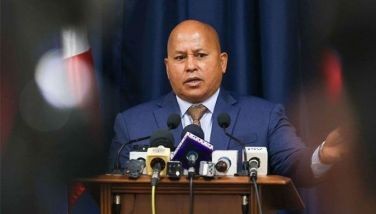Gordon seeks ethanol bill approval
October 30, 2005 | 12:00am
Sen. Richard Gordon pushed anew yesterday for the passage of the ethanol bill in a bid to soften the impact of rising oil prices, made worse by the implementation of the expanded value-added tax (EVAT) on fuel.
"Ethanol is a viable answer to the oil crisis and other related economic problems besetting our country today," Gordon said in a statement.
Gordon noted that ethanol is a renewable energy source "that we can produce locally from indigenous agricultural crops like sugarcane."
When passed, the lawmaker said the ethanol bill will provide the necessary legal framework for the National Bio-Ethanol Program, which aims to reduce the country’s dependence on imported fuel "as well as provide us with a partial hedge to the volatility of fuel prices."
Ethanol is an ideal fuel blend or additive for gasoline that is also environment-friendly, Gordon said.
According to Gordon, a total of 3.7 billion liters of gasoline would easily translate to a total savings of $825 million in foreign exchange over 10 years under the National Bio-Ethanol Program, which will begin using a five-percent blend of gasoline and ethanol from 2007 to 2010, and a 10-percent blend from 2010 to 2017.
Furthermore, the benefits of ethanol are not only limited to the preservation of foreign exchange reserves that will ultimately result in an improved balance of payment.
Gordon said the promotion of the local ethanol industry will also translate into agro-technology development, increased investments, additional employment, increased government revenues and a multiplier effect on support/downstream industries and the service sector.
Gordon proposed the creation of agro-industrial economic zones with post-harvest facilities and ethanol fuel tanks in strategic locations in the country.
"Aside from cutting our energy dependence on imported oil, ethanol may also be a potential export product for our country, just like Brazil which pioneered ethanol fuel in the 1970s to combat rising energy costs, and now exports to Japan and other countries," he said.
On another issue, Gordon urged President Arroyo to dismiss her advisers who have saddled the medical term CPR, or cardio-pulmonary resuscitation, a life-saving technique, with a negative connotation due to the government’s policy of dispersing protest rallies under its "calibrated preemptive response."
Gordon, who chairs the Philippine National Red Cross (PNRC), said the agency and the Department of Health have been trying to promote the life-saving benefits of administering CPR.
But the government’s policy against protesters is giving the acronym a bad name, Gordon told reporters during the weekly Kapihan sa Sulo Hotel forum in Quezon City yesterday.
On Friday, Executive Secretary Eduardo Ermita and top Philippine National Police (PNP) officials were charged before the Office of the Ombudsman with violating Batas Pambansa 880, or the Public Assembly Act, for implementing the CPR policy against anti-government protesters in place of the "maximum tolerance" policy required by law.
Opposition leaders led by former Vice President Teofisto Guingona Jr. filed the complaint after water cannons were used against them while leading a procession toward San Beda Church near Malacañang in Manila last Oct. 14.
In filing the complaint, they pointed out that BP 880 orders police authorities to exercise maximum tolerance during any protest rally or in its dispersal. — With Perseus Echeminada
"Ethanol is a viable answer to the oil crisis and other related economic problems besetting our country today," Gordon said in a statement.
Gordon noted that ethanol is a renewable energy source "that we can produce locally from indigenous agricultural crops like sugarcane."
When passed, the lawmaker said the ethanol bill will provide the necessary legal framework for the National Bio-Ethanol Program, which aims to reduce the country’s dependence on imported fuel "as well as provide us with a partial hedge to the volatility of fuel prices."
Ethanol is an ideal fuel blend or additive for gasoline that is also environment-friendly, Gordon said.
According to Gordon, a total of 3.7 billion liters of gasoline would easily translate to a total savings of $825 million in foreign exchange over 10 years under the National Bio-Ethanol Program, which will begin using a five-percent blend of gasoline and ethanol from 2007 to 2010, and a 10-percent blend from 2010 to 2017.
Furthermore, the benefits of ethanol are not only limited to the preservation of foreign exchange reserves that will ultimately result in an improved balance of payment.
Gordon said the promotion of the local ethanol industry will also translate into agro-technology development, increased investments, additional employment, increased government revenues and a multiplier effect on support/downstream industries and the service sector.
Gordon proposed the creation of agro-industrial economic zones with post-harvest facilities and ethanol fuel tanks in strategic locations in the country.
"Aside from cutting our energy dependence on imported oil, ethanol may also be a potential export product for our country, just like Brazil which pioneered ethanol fuel in the 1970s to combat rising energy costs, and now exports to Japan and other countries," he said.
On another issue, Gordon urged President Arroyo to dismiss her advisers who have saddled the medical term CPR, or cardio-pulmonary resuscitation, a life-saving technique, with a negative connotation due to the government’s policy of dispersing protest rallies under its "calibrated preemptive response."
Gordon, who chairs the Philippine National Red Cross (PNRC), said the agency and the Department of Health have been trying to promote the life-saving benefits of administering CPR.
But the government’s policy against protesters is giving the acronym a bad name, Gordon told reporters during the weekly Kapihan sa Sulo Hotel forum in Quezon City yesterday.
On Friday, Executive Secretary Eduardo Ermita and top Philippine National Police (PNP) officials were charged before the Office of the Ombudsman with violating Batas Pambansa 880, or the Public Assembly Act, for implementing the CPR policy against anti-government protesters in place of the "maximum tolerance" policy required by law.
Opposition leaders led by former Vice President Teofisto Guingona Jr. filed the complaint after water cannons were used against them while leading a procession toward San Beda Church near Malacañang in Manila last Oct. 14.
In filing the complaint, they pointed out that BP 880 orders police authorities to exercise maximum tolerance during any protest rally or in its dispersal. — With Perseus Echeminada
BrandSpace Articles
<
>
- Latest
- Trending
Trending
Latest
Trending
Latest
Recommended






























